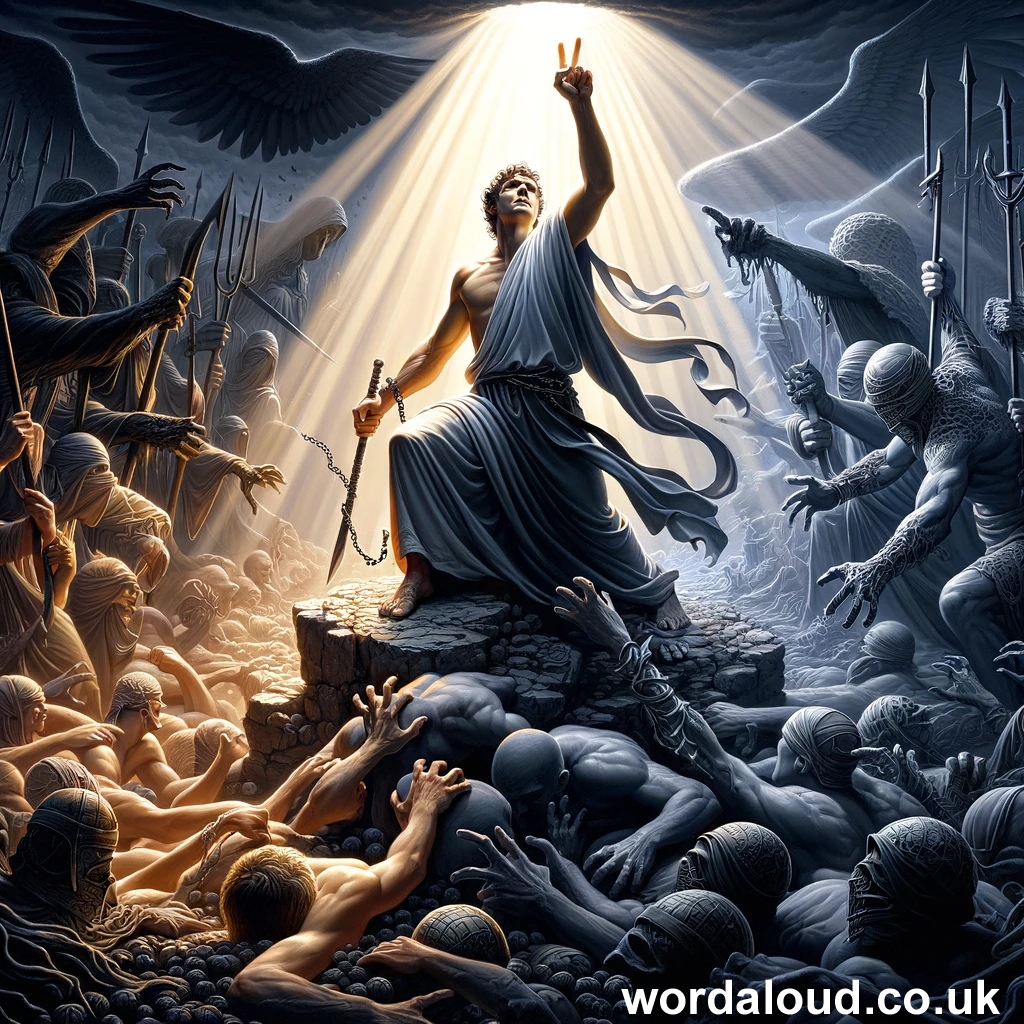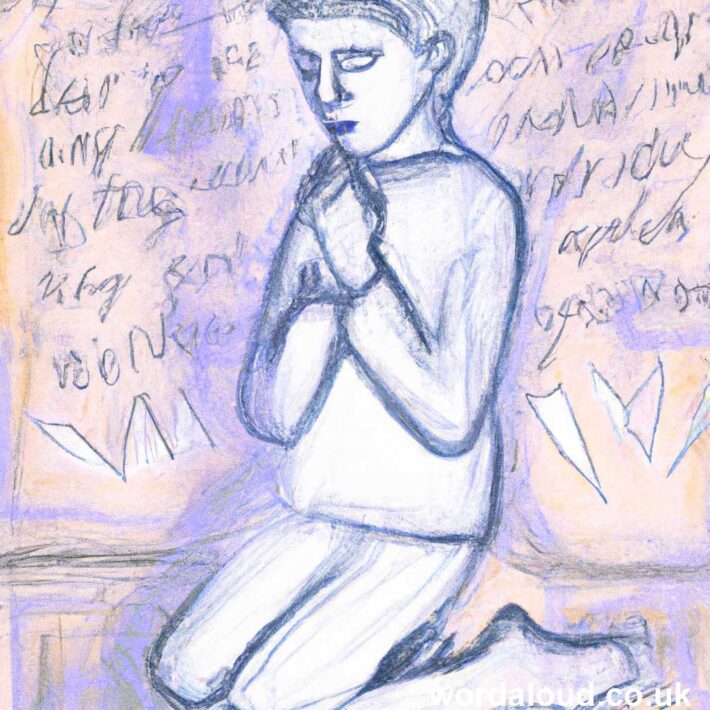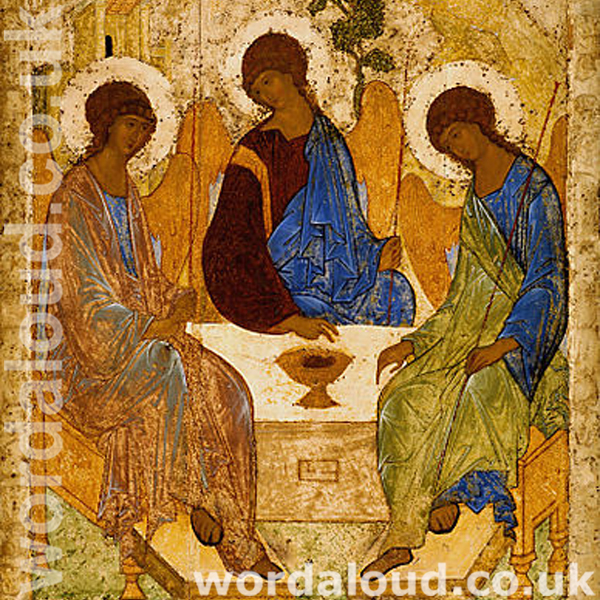Christian Art | Prayer With Jesus | Psalms | Prayer For Deliverance From Enemies | King David As A Boy | A Psalm Of David | King James Audio Bible KJV
Psalm 35 | King James Audio Bible
YouTube: Psalm 35 KJV | King James Audio Bible | Word Aloud
Psalm 35 is a plea for divine intervention and justice. This psalm, attributed to King David, encapsulates turmoil of a soul unjustly persecuted, seeking vindication and deliverance from those who harm him.
A Plea for Help: Psalm 35 begins with a cry: ‘Plead my cause, O Lord, with them that strive with me; fight against them that fight against me’ (Psalm 35:1 KJV). David implores the Lord to take up his cause in the face of adversaries who seek his harm, setting the tone for a heartfelt plea for divine intervention.
Imagery of Warfare: Throughout the psalm, vivid imagery of warfare and conflict depicts the spiritual battle the psalmist faces. Phrases such as ‘Take hold of shield and buckler’ and ‘Draw out also the spear’ (Psalm 35:2-3 KJV) evoke a fierce struggle. The psalmist looks to the Lord as the ultimate source of protection and salvation in this spiritual warfare.
Prayer for Confounding Adversaries: David beseeches the Lord to confound and put to shame those who seek his soul’s destruction (Psalm 35:4 KJV). He implores that those who devise harm and deception against him should face their own downfall, emphasizing divine justice.
Appeal for Deliverance from Enemies: The psalmist pleads for deliverance from the snares and traps set by adversaries. He desires that their schemes backfire and result in their own misfortune (Psalm 35:7-8 KJV). This plea for divine intervention is a recurring motif.
Rejoicing in the Lord’s Salvation: Amidst the anguish and conflict, Psalm 35 also contains expressions of hope and trust in the Lord’s salvation. The psalmist looks forward to rejoicing in the Lord and experiencing His deliverance (Psalm 35:9-10 KJV).
Bearing False Witness: The psalmist laments the false witnesses who have risen against him, falsely accusing him of wrongdoing (Psalm 35:11 KJV). This theme highlights the unjust persecution he faces.
Praise and Thanksgiving: As the psalm unfolds, the psalmist expresses gratitude and praise to the Lord for His deliverance (Psalm 35:18 KJV). It is a testament to enduring faith and trust in God’s righteousness, even in the midst of adversity.

![]()
Psalm 35 | King James Audio Bible KJV | Love Revealed By Jesus Christ
Plead my cause, O Lord, with them that strive with me: fight against them that fight against me.
Take hold of shield and buckler, and stand up for mine help.
Draw out also the spear, and stop the way against them that persecute me: say unto my soul, I am thy salvation.
Let them be confounded and put to shame that seek after my soul: let them be turned back and brought to confusion that devise my hurt.
Let them be as chaff before the wind: and let the angel of the Lord chase them.
Let their way be dark and slippery: and let the angel of the Lord persecute them.
For without cause have they hid for me their net in a pit, which without cause they have digged for my soul.
Let destruction come upon him at unawares; and let his net that he hath hid catch himself: into that very destruction let him fall.
And my soul shall be joyful in the Lord: it shall rejoice in his salvation.
All my bones shall say, Lord, who is like unto thee, which deliverest the poor from him that is too strong for him, yea, the poor and the needy from him that spoileth him?
False witnesses did rise up; they laid to my charge things that I knew not.
They rewarded me evil for good to the spoiling of my soul.
But as for me, when they were sick, my clothing was sackcloth: I humbled my soul with fasting, and my prayer returned into mine own bosom.
I behaved myself as though he had been my friend or brother: I bowed down heavily, as one that mourneth for his mother.
But in mine adversity they rejoiced, and gathered themselves together: yea, the abjects gathered themselves together against me, and I knew it not; they did tear me, and ceased not:
With hypocritical mockers in feasts, they gnashed upon me with their teeth.
Lord, how long wilt thou look on? rescue my soul from their destructions, my darling from the lions.
I will give thee thanks in the great congregation: I will praise thee among much people.
Let not them that are mine enemies wrongfully rejoice over me: neither let them wink with the eye that hate me without a cause.
For they speak not peace: but they devise deceitful matters against them that are quiet in the land.
Yea, they opened their mouth wide against me, and said, Aha, aha, our eye hath seen it.
This thou hast seen, O Lord: keep not silence: O Lord, be not far from me.
Stir up thyself, and awake to my judgment, even unto my cause, my God and my Lord.
Judge me, O Lord my God, according to thy righteousness; and let them not rejoice over me.
Let them not say in their hearts, Ah, so would we have it: let them not say, We have swallowed him up.
Let them be ashamed and brought to confusion together that rejoice at mine hurt: let them be clothed with shame and dishonour that magnify themselves against me.
Let them shout for joy, and be glad, that favour my righteous cause: yea, let them say continually, Let the Lord be magnified, which hath pleasure in the prosperity of his servant.
And my tongue shall speak of thy righteousness and of thy praise all the day long.

![]()
Key Themes Of The Psalm For Reflection | Love Revealed By Jesus Christ
- Divine Intervention: The psalmist earnestly seeks divine intervention and justice from the Lord in the face of adversaries.
- Spiritual Warfare: Vivid imagery of warfare and conflict portrays the spiritual battle the psalmist faces, emphasizing reliance on the Lord for protection.
- Justice and Vindication: The psalmist appeals to the Lord for justice, praying that those who harm him will face their own downfall.
- Deliverance from Enemies: The psalmist pleads for deliverance from the snares and schemes of adversaries, trusting that the Lord will thwart their plans.
- Hope and Rejoicing: Amidst adversity, there is a thread of hope and trust in the Lord’s salvation, leading to expressions of rejoicing in His deliverance.
- False Witness and Unjust Persecution: The psalmist laments the bearing of false witness and unjust persecution, highlighting the need for God’s intervention.
- Gratitude and Praise: The psalmist expresses gratitude and praise to the Lord for His righteousness and deliverance, showcasing enduring faith.








